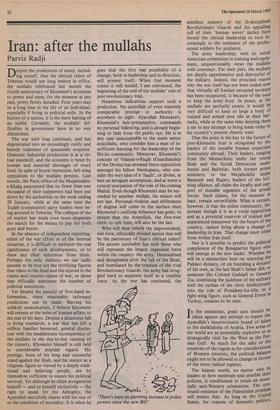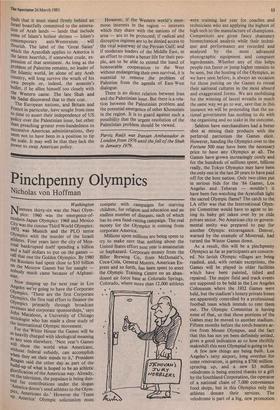Iran: after the mullahs
Parviz Radji
Despite the predictions of many, includ- ing myself, that the clerical rulers of Teheran would not long endure in office, the mullahs celebrated last month the fourth anniversary of Khomeini's accession to power and seem, for the moment at any rate, pretty firmly installed. Four years may be a long time in the life of an individual, especially if living in political exile. In the history of a nation, it is the mere batting of an eyelid. Certainly, the mullahs' dif- ficulties in government have in no way diminished.
The war with Iraq continues, and has degenerated into an exceedingly costly and bloody stalemate of spasmodic eruption. Domestic industrial production is at a vir- tual standstill, and the economy is beset by human and material shortages of every kind. In spite of brutal repression, left-wing opposition to the mullahs persists. Last month, the Paris office of the Mujaheddin- e-Khalq announced that no fewer than one thousand of their supporters had been put down by the authorities in the week ending 28 January, while at the same time the Tudeh (communist) party leaders were be- ing arrested in Teheran. The collapse of the oil market has made even more desperate the search for the means to pay for both guns and butter.
In the absence of independent reporting, either of the war effort or of the internal situation, it is difficult to interpret the real significance of such developments, or to draw any clear inferences from them. Perhaps the only statistics we can sadly assume to be true are the terrifying figures that relate to the dead and the injured in the claims and counter-claims of war, or those that officially announce the number of political executions.
Yet despite the paucity of first-hand in- formation, some reasonably informed predictions can be made. Barring his unlikely assassination, I believe Khomeini will remain at the helm of Iranian affairs to the end of his days. Despite a disastrous fall in living standards, a war that has left a million families bereaved, general discon- tent with the meddlesome incompetence of the mullahs in the day-to-day running of the country, Khomeini himself is still held in considerable popular regard. His prestige, born of his long and successful stand against the Shah, and his stature as a religious figure as viewed by a deeply tradi- tional and believing people, are by themselves sufficient to ensure his political survival. Yet although he often arrogates to himself — and to himself exclusively — the right to speak for the Almighty, the Ayatollah mercifully shares with the rest of us the condition of mortality. It is when he goes that the first real possibility of a change, both in leadership and in direction, will present itself. When that moment comes it will herald, I am convinced, the beginning of the end of the mullahs' rule of post-revolutionary Iran.
Numerous indications support such a prediction. No ayatollah of even remotely comparable prestige or authority is anywhere in sight. Ayatollah Montazeri, Khomeini's heir-presumptive, commands no personal following, and is already begin- ning to fade from the public eye. He is in any case unacceptable to the more senior ayatollahs, who consider him a man of in- sufficient learning for the leadership of the Shi-ite community. Moreover, Khomeini's concept of Velayat-e-Faqih (Guardianship of the Divine) has aroused fierce opposition amongst his fellow theologians, who con- sider the very idea of a faqih', or divine, at best an arrogant assumption, and at worst a cynical usurpation of the role of the coming Mahdi. Even though Khomeini may be suc- ceeded by another mullah, his tenure will not last. Personal rivalries and differences of dogma will come to the surface once Khomeini's unifying influence has gone, to ensure that the Ayatollah, the first-ever cleric to rule Iran, will also be the last.
Who will then inherit the impoverished, war-torn, ethnically divided nation that will be the patrimony of Iran's clerical rulers? The answer inevitably lies with those who still represent the largest organised force within the country: the army. Demoralised and decapitated after the fall of the Shah, and humiliated by the creation of the rival Revolutionary Guards, the army has strug- gled hard to maintain itself as a credible force. As the war has continued, the
'There's been an alarming increase in police powers since the new Bill'.
mindless zealotry of the ill-disciplined Revolutionary Guards and the appalling toll of their 'human waves' tactics have forced the clerical leadership to turn in- creasingly to the remnants of the profes- sional soldiers for guidance. The army leadership, with its initial American orientation in training and equip- ment, unquestionably views the mullahs with contempt. For their part, the mullahs are deeply apprehensive and distrustful of the military. Indeed, the principal reason why the war itself has not been ended now that virtually all Iranian occupied territorY has been recaptured, is because of the need to keep the army busy. In peace, as the mullahs are perfectly aware, it would be very difficult to keep so large a body of trained and armed men idle in their bar- racks, while at the same time denying them a say in any attempt to bring some order to the country's present chaotic state. That the,army is the key to the future of post-Khomeini Iran is recognised by the leaders of the sizeable Iranian expatriate community abroad. Their leaders, ranging from the Monarchists under the young Shah and the Social Democrats under Amini and Bakhtiar, both former prime ministers, to the Mujaheddin under Banisadr and Rajavi, leaders of the left- wing alliance, all claim the loyalty and suP- port of sizeable segments of the armed forces. Such claims, for the moment at least, remain unverifiable. What is certain, however, is that the exiled community, im- portant though it is as a vocal opposition and as a potential reservoir of trained and experienced manpower for the future of the country, cannot bring about a change of leadership in Iran. That change must come from within Iran itself. Nor is it possible to predict the political complexion of the Bonapartist figure who will emerge as the new leader. Whether he will be a monarchist bent on restoring the Pahlavi dynasty, or on founding a dynasty of his own, as the late Shah's father did; or someone like Colonel Gaddafi or General Zia, combining the jackboot of the military with the turban of the cleric infelicitously into the role of President-for-life; or .a fight-wing figure, such as General Evren ifl Turkey, remains to be seen.
In the meantime, great care should be taken against any attempt to export the Ayatollah's insurrectionist brand of Islam to the sheikhdoms of Arabia. Few areas of the world are as potentially explosive or as strategically vital for the West as the Per- sian Gulf. As much for the sake of the countries of the region as for considerations of Western interests, the political balance ought not to be allowed to change in favour of the more radical regimes. The Islamic world, no matter who its leaders or how moderate and sensible their policies, is conditioned to retain an essen- tially anti-Western orientation. The con- tinued existence of the Palestinian problein will ensure that. As long as the United States, for reasons of domestic politics, finds that it must stand firmly behind an Israel boastfully committed to the annexa- tion of Arab lands — lands that include some of Islam's holiest shrines — Islam's contemporary anti-Westernism will flourish. The label of the 'Great Satan' Which the Ayatollah applies to America is the latest heartfelt, if somewhat crude, ex- pression of that sentiment. As long as the Problem of Palestine remains, no leader of the Islamic world, let alone of any Arab country, will long survive the wrath of his Own people or, indeed, the assassin's bullet, if he allies himself too closely with the Western cause. The late Shah and Mr Sadat discovered that to their cost.
The European nations, and Britain and France in particular, have sought from time to time to assert their independence of US Policy over the Palestinian issue, but other than preaching greater even-handedness to successive American administrations, they seem not to have been in a position to tip the scale. It may well be that they lack the Power to sway American policy. However, if the Western world's enor- mous interests in the region — interests which they share with the nations of the area — are to be protected; if radical and disruptive regimes are to be denied access to the vital waterway of the Persian Gulf; and if moderate leaders of the Middle East, in an effort to create a better life for their peo- ple, are to be able to extend the hand of honourable cooperation to the West without endangering their own survival, it is essential to remove the problem of Palestine from the agenda of East-West dialogue.
There is no direct relation between Iran and the Palestinian issue. But there is a rela- tion between the Palestinian problem and the potential emergence of other Khomeinis in the region. It is to guard against such a possibility that the urgent resolution of the Palestinian problem should be viewed.
Parviz Radji was Iranian Ambassador in London from 1976 until the fall of the Shah in January 1979.















































 Previous page
Previous page